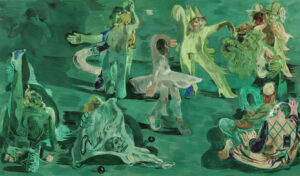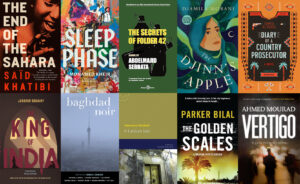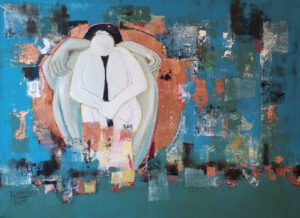Shalaw Habiba
Translated by Savan Abdulrahman
(1)
You’re watering the plants for the second time, but they wilt with your over-graciousness. In most scenes, you hold the vessel and gaze at the flowers. It’s obvious from the scene that the flowers are drowned in water, but you’re no longer there. The flowers have no clue that you’re sad; unless in the animation world. All of a sudden, it might occur to you that this is the second time you’re watering them, or you might never know. You may have continually watered these plants for days with sorrow and never understood why all these flowers wilted over the years. Now you know: sadness wilts flowers.
(2)
You sit at a café, but your tea gets cold. This has happened many times before, perhaps because you were talking too much to a friend. But now, it’s happening because you are alone and the café is not delightful enough to help you drink your tea at ease. Sometimes you feel that cafés are so saddening, unable to provide you a few seconds to drink your tea. You feel as if the cafés are a part of Edward Hopper’s paintings, wide and empty of humans. When you finally awaken enough to take a sip of your tea, it’s too late. You might say, “what a relief,” because you are afraid that the sip might cause you more sadness. When you leave, your tea remains untouched. The waiter is unaware that this incident, with all its tension, has occurred right here.
(3)
You find yourself drawn to talking with strangers. Not only that, but you’re divulging intimate details about your life. Despite not understanding why, you continue to do so. One day, when you feel better, you become consumed by a deep sense of shame for opening up to those you barely knew. The thought of bumping into them again terrifies you, reminding you of those nights when you chattered away and yet didn’t find solace. All the people of those sad nights cause you more sadness in another era. Humans cannot outrun everyone; in the end, they will fall into the trap. The trap of sadness.
(4)
You welcome someone’s arm around you, or the arms of many more. You seek refuge in the embraces, thinking that it will alleviate your sadness. It’s common to burst into tears in those embraces, not because they are comforting, but because they are not your own. This way, you shift from one embrace to another, but your heart doesn’t return to its previous state. The former heart no longer exists. It’s okay to resort to promiscuity, whether you’re a man or a woman. Maybe only then, you feel crowded, believing that you’ll have no more space for sadness. However, you don’t realize that you’re only becoming a sad prostitute.
(5)
You have agreed not to turn down anyone’s offer to go to the cinema, but movies remind you of your sadness. You are aware that many directors have experienced the same type of sadness as you for ages. The ideas may have originated from a moment of sadness, just like yours. However, now you are frightened of any kind of idea, films, and books. You are frightened of anything that touches upon your sadness. You do whatever it takes to escape, but you realize that you are drawing closer and closer.
(6)
The last time you were happy, you left your book on the page where the character was devastated and lost. The door stands open, waiting for someone to enter, while the window gazes at the moon as always. You don’t dare to go back to that world, afraid of what the next page might bring, dreading the heartbreak it could mean. You know that all these incredible books exist in the world, but you fear them all. You’re certain they’ll all touch upon your sorrow, and you dread such confrontations because you feel deeply lonely. Loneliness consumes you, and each passing moment could deepen your sadness. You yearn to forget and be comforted, yet you know that books won’t let you easily settle, or find comfort. The books are tangled up with all your sadness by an imaginary line, and no person can unravel all their knots.
(7)
You walk in the forest, swim, sometimes you wear your headphones and go for a run or ride a bike. You hold a stone and throw it at something or somewhere, you kick something on the ground, you sit down, and reflect on a meaningless object. You gaze at a deer that gazes back at you, or a child who’s crying after her mother. All of a sudden, you remember it’s late and you have to go back home, and you’re terrified of going home. You fear your room, which is the size of a matchbox. You feel as though everything happened in that one room. You never want to go back home because you fear bewilderment. You fear the sadness in the house and the loneliness it brings. You fear places because they sadden you more than anything else.
(8)
We were all happy once, but now those days have metamorphosed into mere relics of remembrance. The specter of those halcyon times now causes you pain. You sense that you didn’t fully taste the joy of those days when you could have genuinely laughed from the heart and truly experienced a good day. You strive to suppress thoughts, memories, gazes, visions, and even the touch of others. Your sole yearning is to traverse the realm of time, cognizant that time doesn’t pass; time never passes. Despite this knowledge, you fear the nights that lie ahead of you. You fear the years that await you because you have to live them. You believe an insidious curse has contrived an ambush for you.
(9)
Hushed, motionless, pallid, weary, and adorned with melancholic eyes, you behold neither soul nor soliloquy for spans of weeks, months, or perchance, years. Then, one night, even though nothing significant happens, you suddenly succumb to a deluge of tears, as if seeking emancipation from the weight of distress, but you only find peace for a few seconds after sobbing, while the enduring specter of sorrow looms unchanged. Because your sorrow is a possession solely your own, it belongs to no one else. It awaits your homecoming, trailing your steps along the thoroughfares and marketplaces. It walks ahead of you when you take a stroll, and it usurps your chair within the café, as you yearn to drink the tea that you can’t savor. When tears cascade, you deem them a rightful salve to banish your woe, yet with each instance, you find yourself starting all over again in a perpetual cycle. This phenomenon is called “heart-wrenching.”
(10)
More and more, you delve into the art of smiling, transforming into a jester, and assuming the role of a fool. Perhaps this holds the key for you. You cannot confide your sorrow in just anyone, but your friends are the kind who can see the veiled melancholy behind your laughter. They understand when your solitude returns, comprehend the anguish your heart inflicts, for they have traversed similar paths. Each one strives to vanquish their sorrow through varied means or enshroud it away. Some write, some bring forth movies, even if marred by imperfection. And there exist those you can’t understand because they choose to do nothing. Some run away when someone falls in love with them, deeming it a snare for their sorrow. Others resort to any measure to stave off the pangs, yet remain oblivious to the sole remedy — acclimating to its presence. Consider your sorrow a constant companion, devoid of emotion, devoid of grace. Know that those who mock existence have endured these very torments. Those who mock existence commenced their journey in tears.
(11)
To escape from your sorrow, you often rely on fellow mortals. Humans are condemned to seek solace in their very tormentors.
(12)
You elude the melodies, for they overflow with memories. Music comprehends you more profoundly than any human can. Music possesses a devouring quality surpassing that of books, movies, or any other art form and darkens you sooner. A melancholic melody proves more lethal than anything else. Not only music itself, but also the very words, sounds, names, and tones possess the capability to dismantle you. Although arduous to comprehend, it currently unfolds within you.
(13)
As you are incapable of withstanding the fragrance of an embrace, you seek solace in another’s arms. Yet, you discover the scent of that alternative embrace carries its own poignant anguish. Thus, you turn and seek solace in yet more embraces, where each scent invokes a memory, forcing you to compare every embrace in existence to a singular one. In this manner, your sorrow becomes synonymous with the amalgamation of all the embraces that shift you from one to another. All the embraces in which you sought refuge prove more agonizing than life itself. Now, you yearn to conceal yourself from one of those embraces, concealed amidst the multitude of others.
(14)
You elude the allure of scents, escape sounds, and escape from colors. The vast expanse of the universe sprawls before you, yet you find yourself spellbound by the absence of even a minuscule trace of happiness for yourself. In seeking solace, you retreat to childhood recollections, delving into memories of playful moments with cherished toys, or indulging in the familiar world of Tom and Jerry. Alternatively, you grasp a piece of paper and commence scrubbing, for in your perception, the realm of childhood exudes purity. However, should you peruse Freud’s teachings, you would apprehend that even childhood harbors shades of hatred, repression, animosity, and even violence. Do not be disheartened if I reveal that avenues to happiness have dwindled. Only you can perceive sadness as an experience interwoven into the tapestry of human existence. Perhaps, if you are capable of embracing humor, it is preferable to encounter an accident of sorrow rather than one of the automotive kinds.
(15)
During rainfall, amidst clouds, in the evening, throughout the day, and in the depths of night, whether witnessing the presence or absence of cars, whether events unfold or remain stagnant, through every conceivable circumstance or none at all, your sorrow deepens, close to shedding tears. This is a stark contrast to a time when you once reveled in these very experiences, even when encountered through the pages of books or the frames of movies. You find yourself questioning why this affliction has befallen you. While you may possess some inkling of an answer, it is of no use to you. In these melancholic days, aside from evading all kinds of things, you find yourself compelled to flee from those very sources of joy. You escape, not necessarily toward an aim.
(16)
You may be presented with an opportunity to embark on a journey, yet you ponder: does one truly need to traverse distant lands and countries to encounter a sorrowful event when it can be experienced in close proximity, nestled right beside oneself, and endured with all its intensity?
(17)
You may embark on a visit, but despondent souls are never truly present at such gatherings. When sadness consumes you, the act of eating becomes a harrowing ordeal. It feels as if an unwelcome presence has settled within you, impeding the passage of nourishment, or perhaps it is the imagined scrutiny of the entire world, questioning how you can partake in that succulent chicken while harboring such sorrow. In essence, humans are intricately entangled in their tribulations, to such an extent that one might be compelled to seek solace and answers within the realms of Google. However, all these inquiries prove futile, serving only to deepen the well of melancholy, as you perceive yourself ensnared by a triviality, condemned to remain entangled within its grasp.
(18)
You capture photos, merely to refrain from revisiting them in the future.
(19)
One day, even your sadness will turn its back on you, leaving you hollow like an oud that echoes.




































